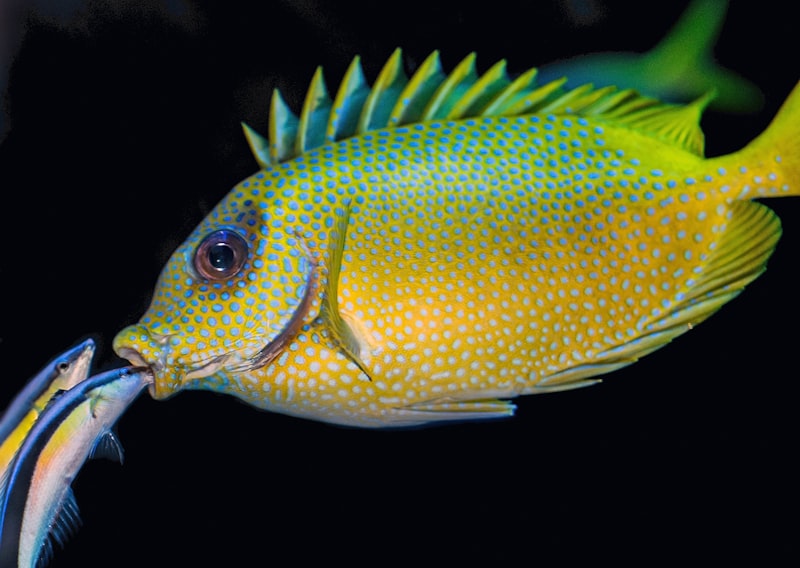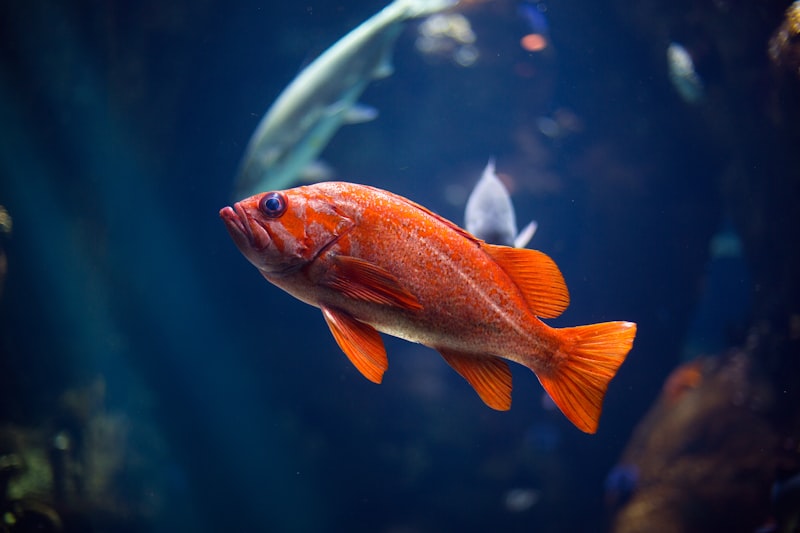Ever wondered how fish stay healthy in their underwater world? Let’s dive into the fascinating world of fish immune systems. Just like us, fish have an incredible defense system that protects them from diseases and keeps them thriving in their aquatic habitats.
Unlike mammals, fish don’t have lymph nodes or bone marrow, but their immune systems are just as effective. They rely heavily on their skin, scales, and mucus to create a barrier against pathogens. Imagine their scales like armor, shielding them from potential invaders lurking in the water.
But that’s not all. Fish also have innate immune responses that kick in immediately when they encounter a threat. This rapid response includes antimicrobial proteins and cells that engulf and destroy foreign particles. It’s like having a rapid-response team on standby, ready to neutralize any intruders.
What’s truly remarkable is how fish adapt to their environment. Their immune systems can adjust based on factors like water temperature and quality. It’s as if they have a built-in environmental sensor that fine-tunes their defenses accordingly.
Interestingly, some fish species have even developed specialized immune adaptations. For instance, certain fish can produce antibodies in response to specific pathogens, similar to how our bodies create immunity after a vaccination. This adaptive immune response helps them fight off recurring infections and build long-term protection.
Next time you marvel at a school of fish gliding effortlessly through the water, remember their immune systems are working tirelessly behind the scenes. From physical barriers to sophisticated defense mechanisms, these aquatic wonders have mastered the art of staying healthy in their watery world.
Unveiling the Underwater Arsenal: How Fish Boost Their Immune Defenses
Fish, much like humans, face constant microbial challenges in their environment. Yet, their defense mechanisms are nothing short of awe-inspiring. One of the key ways fish boost their immune defenses is through their skin. This outer layer acts not only as a barrier against physical harm but also houses specialized cells that actively combat pathogens. Imagine it as a fortress wall, brimming with vigilant guards ready to repel invaders.
But that’s not all – within their bodies, fish possess an intricate network of immune organs. These include the spleen, kidney, and liver, each playing a crucial role in immune response. Think of them as strategic command centers, coordinating the fish’s defenses with precision and efficiency. When a threat is detected, these organs mobilize a rapid response, akin to a well-drilled army springing into action.
Interestingly, fish also rely on a unique substance called mucous. Far from being a mere slime, fish mucous contains potent antimicrobial properties. It coats their scales and gills, forming an additional line of defense against harmful bacteria and parasites. Picture it as a protective shield, keeping the fish safe amidst the murky waters they inhabit.
Moreover, the diet of a fish plays a pivotal role in enhancing its immune system. Just like how our diet influences our health, fish consume foods rich in vitamins, minerals, and antioxidants that bolster their immunity. It’s akin to them stocking up on essential supplies to maintain their defenses at optimal levels.
From Fins to Defenses: Exploring the Evolutionary Wonders of Fish Immunity
At the forefront of fish immunity are mucosal surfaces, akin to our own respiratory and digestive linings but far more intricate. These surfaces act as the first line of defense, armed with mucins and antimicrobial peptides that thwart invaders before they breach deeper into the body. Imagine these mucosal linings as fortified castle walls, repelling pathogens attempting to infiltrate the fish’s body.
Deep within fish tissues, specialized immune cells patrol vigilantly. Macrophages, neutrophils, and dendritic cells act as sentinels, ready to engulf and neutralize any foreign entity that manages to slip past initial defenses. These cells are the frontline warriors, swift and decisive in their actions, akin to guards intercepting intruders before they can cause harm.

Beyond cellular defenses, fish boast a diverse arsenal of proteins that orchestrate immune responses with precision. Complement proteins, for instance, form a biochemical cascade that labels pathogens for destruction while triggering inflammation—a vital response that signals the immune system to mobilize reinforcements.
Interestingly, fish immune systems exhibit remarkable plasticity, capable of adapting swiftly to new challenges. This adaptability is crucial in aquatic ecosystems, where environmental changes can occur rapidly. Fish can adjust their immune responses based on factors like water temperature, salinity, and even the presence of pollutants—an evolutionary feat that underscores their resilience in dynamic habitats.
Swimming Through Challenges: How Stress Impacts Fish Immune Responses
When fish encounter stressful situations, whether due to changes in water temperature, pollution levels, or even predatory threats, their bodies react swiftly. Stress hormones flood their systems, signaling a cascade of responses aimed at survival. These responses, while essential in the short term, can compromise their immune systems over time.
Like humans, fish have intricate immune systems designed to protect against pathogens. However, under chronic stress, these defenses may weaken. The constant release of stress hormones can suppress immune function, leaving fish vulnerable to diseases that they would normally resist. It’s akin to a tired swimmer struggling against the current—they may eventually succumb to fatigue.

Researchers studying fish stress responses have found parallels with human stress physiology. The impact on immune function is a critical area of study, with implications for both aquatic ecosystems and aquaculture practices. By understanding how stress affects fish immunity, scientists can develop strategies to mitigate these effects, ensuring healthier fish populations and sustainable aquatic environments.
The next time you observe fish swimming gracefully in a pond or river, consider the challenges they face beneath the surface. Stress isn’t just a human experience—it’s a universal challenge that impacts all living beings, including our aquatic friends. By unraveling the complexities of stress and immunity in fish, we gain valuable insights into their well-being and the health of our aquatic ecosystems.
Guardians of the Deep: Understanding Fish Immune Systems in Changing Oceans
Have you ever wondered how fish thrive in the vast, ever-changing oceans? It’s not just their sleek bodies or graceful movements that keep them resilient; it’s their remarkable immune systems. Fish, like humans, have intricate defense mechanisms that protect them from diseases and environmental stressors. These “Guardians of the Deep” are essential to maintaining the delicate balance of marine ecosystems.
Fish immune systems are fascinatingly adaptive. They rely on both innate and acquired immunity to ward off infections. Innate immunity acts as the first line of defense, consisting of physical barriers and nonspecific cellular responses that quickly recognize and neutralize threats. Meanwhile, acquired immunity, akin to our own immune system, develops over time as fish encounter pathogens. This adaptive response creates a memory of past infections, enabling fish to mount a quicker and more effective defense upon subsequent exposures.
In the face of climate change and ocean pollution, understanding fish immune systems is crucial. Rising water temperatures, ocean acidification, and pollutants challenge fish immunity, making them more susceptible to diseases. Scientists are studying how these environmental stressors impact immune function, seeking ways to bolster fish resilience in a changing world.
Imagine fish as guardians not only of their underwater realms but also as indicators of ocean health. Just as a canary in a coal mine warns of danger, fish health reflects the condition of marine ecosystems. By protecting fish immune systems, we safeguard biodiversity and ensure sustainable fisheries for future generations.
Frequently Asked Questions
What factors affect the immunity of fish?
Factors affecting fish immunity include water quality, temperature fluctuations, stress levels, nutrition, and exposure to pathogens. These elements play crucial roles in determining the health and resilience of fish immune systems.
How do fish defend themselves against pathogens?
Discover how fish protect themselves from pathogens with this concise FAQ. Learn about their immune systems, protective mucous layers, and unique behaviors that help ward off diseases.
What diseases commonly affect the immune systems of fish?
Learn about common diseases that affect fish immune systems, including symptoms, causes, and prevention strategies.
What are the key components of a fish’s immune system?
Discover the essential components of a fish’s immune system, including barriers like skin and mucus, cellular defenders like leukocytes, and molecular components such as antibodies and cytokines. Learn how these elements work together to protect fish from pathogens and maintain their health.
How can environmental conditions impact fish immune health?
Learn how environmental conditions affect fish immune health and discover practical insights on mitigating these impacts.


